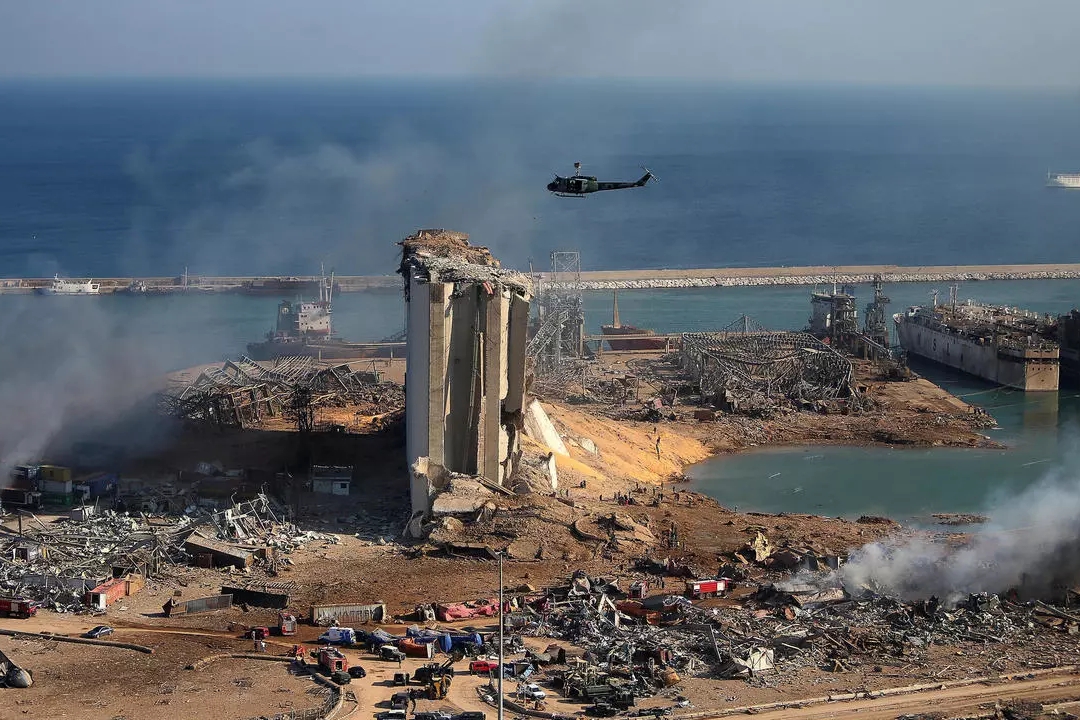The remaining grain silos were on fire over the weekend, displaying a scene that has triggered the population that continues to suffer from the trauma of the explosion.
Lebanon is scheduled to discuss with Qatar its plans to build two new grain silos in Beirut as it grapples with a worsening food security crisis, the Associated Press (AP) reported on Wednesday.
Beirut’s caretaker economy minister, Amin Salam told the AP that countries including the US, Germany, the UAE and France already expressed their interest in the $100 million project. He noted that he will visit Qatar “soon” to discuss the plan.
Salam said he is also in talks with the World Bank and the United Nations High Commissioner for Refugees to fund the project.
Lebanon’s grain silos bore the brunt of the tragic Beirut Port explosion in 2020, where hundreds of tonnes of ammonium nitrate triggered one of the biggest explosions in modern time.
At least 200 people were killed in the tragic incident.
“Building the silos will be serious crisis management, because we need the (grain) reserves,” Salam told the AP.
Silos that remain standing caught fire over the weekend, with authorities warning of a potential collapse.
The deadly explosion exacerbated Lebanon’s economic situation, which is already struggling with the impact of the Covid-19 outbreak. More than three quarters of Lebanon’s population has been pushed into poverty, with many unable to access their savings.
Meanwhile, the currency has lost 90% of its value to the US dollar.
Despite billions of aid sent to Lebanon to alleviate conditions in the aftermath of the blast, it has yet to financially recover. Qatar was the first country to offer direct support for Lebanon, pledging more than $70 million in donations.
The country is also facing a fuel shortage and an electricity crisis, that has left most of the population receiving limited power access.
Lebanon’s state electricity company Electricité du Liban (EDL) has accumulated $40 billion of debt, roughly 43% of government debt, since 1992, according to Energy for Growth Hub.
Qatar’s efforts
The Gulf state has extended a helping hand to the crises-hit country on multiple occasions.
Last week, Qatar helped Lebanon secure some 991,000 litres of fuel that will be used by healthcare facilities nationwide, according to Qatar Fund for Development (QFFD).
The assistance is expected to provide crucial support to some 40 hospitals, healthcare facilities and elderly homes in Lebanon.
“The Lebanese Ministry of Public Health received two batches of about 991,000 liters of fuel Funded by Qatar Fund for Development. Where this will support more than 40 hospital and health facilities and elderly care homes from this support,” QFFD said in a tweet.
The Gulf state is already providing the Lebanese army with 70 tonnes of food per month for an entire year to help alleviate some burdens for authorities in Beirut.
Last month, a trip to Beirut by Qatar’s Foreign Minister Sheikh Mohammed bin Abdulrahman Al Thani saw the official pledge a further $60 million to the military.
In February last year, Qatar’s foreign minister also expressed his readiness to support Lebanon’s economy once it forms a government.
In May, Lebanon held its first parliamentary elections since 2018 and the first since the 2019 revolution against the ruling elite. The revolution also saw the resignation of then-Prime Minister Saad Hariri.
Hariri ended his political career in January this year.
While the elections were seen as the last hope for many Lebanese worldwide, some have been left disappointed with the results, noting the newly-elected officials have contributed to the country’s crises.
Sheikh Mohammed previously stressed the need to address Lebanon’s political divide to resolve its decades-long crises.
“Unfortunately, the people of Lebanon are under a lot of political pressure from their own political leaders. This is what resulted at the end of the day with what we have seen now with these divisions,” he told Newsweek’s podcast, The Diplomat, while he was in DC earlier this year.







